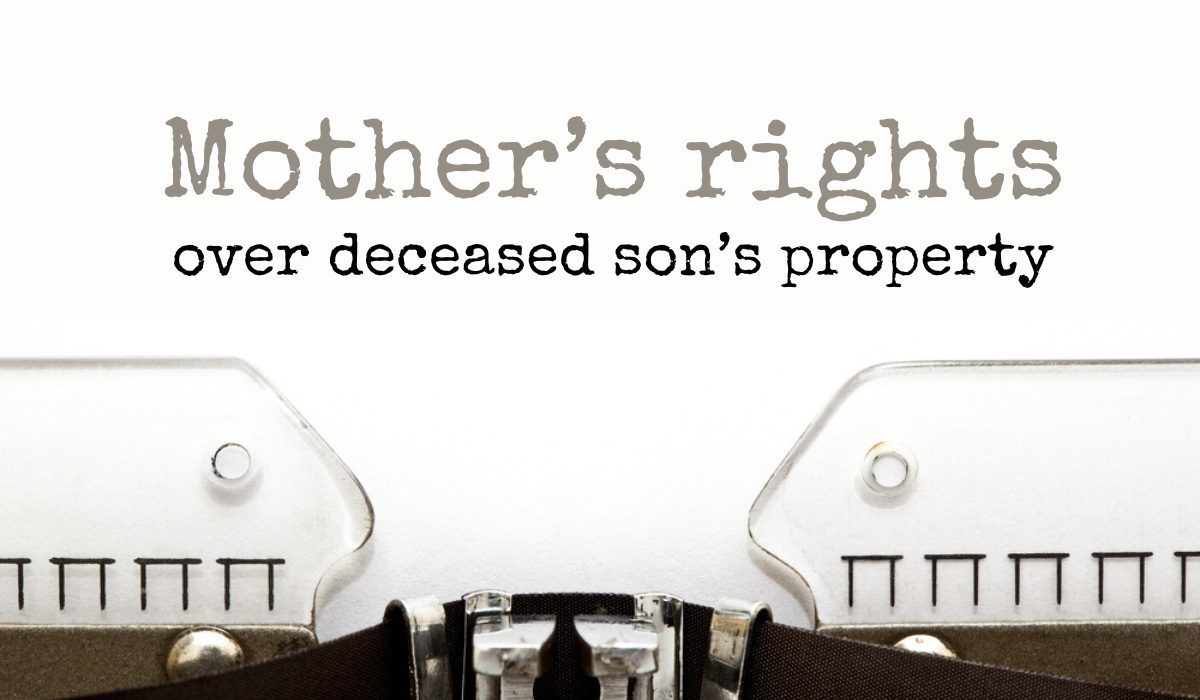In India, the laws regarding inheritance can be intricate, often posing challenges in comprehending an individual’s entitlement to his/her relative’s property. When it comes to a mother’s rights over her deceased son’s property, provisions are outlined in the Hindu Succession Act of 1956. If you’re interested in understanding the rights that a mother holds over her deceased son’s property in India, continue reading.
Legal heirs of a deceased individual
In India, following a person’s death, the legal heirs are determined according to the succession laws relevant to their religion. Under the Hindu Succession Act, the Class-I heirs encompass the spouse, children, and mother. In the absence of Class-I heirs, the inheritance extends to other relatives. For individuals adhering to other religions, the hierarchy of legal heirs is governed by personal laws, usually including the spouse, children, parents, and other designated family members. If a valid will exists, the distribution of assets is guided by its provisions.
What is Class-I heir?
In India, according to the Hindu Succession Act, Class-I heirs are the closest relatives who hold the highest priority for inheritance. Class-I heirs include:
- Daughter
- Son
- Widow
- Mother
- Widow of a predeceased son
- Daughter of a predeceased son
- Son of a predeceased son
- Daughter of a predeceased daughter
- Son of a predeceased daughter
- Widow of a predeceased son of a predeceased son
- Daughter of a predeceased son of a predeceased son
- Son of a predeceased son of a predeceased son
Does a mother have any right over deceased son’s property?
The simple answer to this question is yes. In accordance with the Indian inheritance laws, a mother possesses the legal entitlement to inherit her deceased son’s property. The Hindu Succession Act acknowledges the mother as one of the Class-I heirs, thereby granting her a rightful share in her son’s estate. However, the specifics may vary depending on the circumstances, the existence of a valid will and relevant laws. For instance, the mother’s rights to her son’s property may encompass the right to utilise a portion of the property, the right of control and the right of habitation.
In the event of a son’s demise, the mother becomes the primary legal heir to his estate. Consequently, she is entitled to a portion of the estate, regardless of whether her son had made a will. The size of her share hinges on the number of other legal heirs the son had. If the son had no other legal heirs, the mother would inherit the entire estate. However, if there are other legal heirs, the mother’s share will be determined by the provisions outlined in the Hindu Succession Act.
The mother retains the right to reside in the property if it is her son’s residential property, a privilege known as the “right of residence”. She can inhabit the property and utilise it as her dwelling, provided she fulfils the requisite tax and fee obligations. Furthermore, she can leverage the property for income generation, such as through renting or utilising it for business purposes. Additionally, the mother holds the authority to control and administer the estate. This empowers her to make decisions regarding the management of the estate, including asset sales or transfers, as well as the settlement of debts and taxes. Moreover, she possesses the prerogative to appoint a manager or trustee to oversee the estate on her behalf.
The rights of a mother in her deceased son’s property are not absolute. These rights can be superseded by the provisions of a will or other legal document if the deceased son had made one. For instance, if the son specified in his will that certain assets were to be allocated to specific individuals, the mother’s rights in those assets would be automatically overridden by the terms of the will.
Moreover, the mother’s rights in her deceased son’s property can be surpassed by the provisions of the Hindu Succession Act. According to this law, the mother’s portion of the estate may be diminished or nullified if the son had living descendants at the time of his demise. For instance, if the son had a living child, the mother’s share of the estate would be reduced to one-third of the total value of the estate.
What are the rights of parents over their deceased son’s property?
In the event of a deceased son, the property initially passes to the mother and subsequently to the father. If the mother is dead, the property then transfers to the father and his co-heirs.
Does mother have rights over her deceased son’s property if he was disinherited?
In instances where a family disowns their son, the son is unable to inherit his parents’ self-acquired property. However, he retains the right to claim his share in the ancestral property. Similarly, if the family has disowned their son, the mother holds no rights to the late son’s self-acquired property. In such cases, the property will be evenly divided among his surviving wife and children. The ancestral property will be distributed equally in accordance with the Hindu Succession Law.
In a nutshell
All in all, in relation to her deceased son’s property, a mother’s rights are outlined by the Hindu Succession Act, 1956. These rights encompass the entitlement to receive a share of the estate, the right to reside in the property, and the authority to control and administer the estate. Nevertheless, these rights may be superseded by the provisions of a will or other legal document, or by the stipulations of the Hindu Succession Act itself.
FAQs
What are mother's rights over her deceased son’s property?
In India, a mother's rights over her deceased son's property are governed by the Hindu Succession Act of 1956. As a Class-I heir, she is entitled to inherit a share of her son's estate, alongside other legal heirs like the spouse and children.
Who are considered as legal heirs of a deceased individual in India?
Legal heirs in India are determined by the succession laws relevant to their religion. Under the Hindu Succession Act, Class-I heirs include the spouse, children, and mother. For other religions, the hierarchy of legal heirs typically includes the spouse, children, parents, and designated family members.
Does a mother have any rights over her deceased son's property?
Yes, a mother has rights over her deceased son's property in India. As a Class-I heir under the Hindu Succession Act, she is entitled to a share of the estate, the right of habitation, and the authority to control and manage the estate.
What are the rights of parents over their deceased son’s property?
If the son is dead, the property initially passes to the mother and subsequently to the father. If the mother is dead, the property transfers to the father and his co-heirs.
Does a mother have rights over her deceased son’s property if he was disinherited?
If the family has disowned their son, the mother holds no rights to the late son's self-acquired property, and it is divided among his surviving wife and children, adhering to the Hindu Succession Law.
| Got any questions or point of view on our article? We would love to hear from you. Write to our Editor-in-Chief Jhumur Ghosh at [email protected] |

Dhwani is a content management expert with over five years of professional experience. She has authored articles spanning diverse domains, including real estate, finance, business, health, taxation, education and more. Holding a Bachelor’s degree in Journalism and Mass Communication, Dhwani’s interests encompass reading and travelling. She is dedicated to staying updated on the latest real estate advancements in India.
Email: [email protected]











